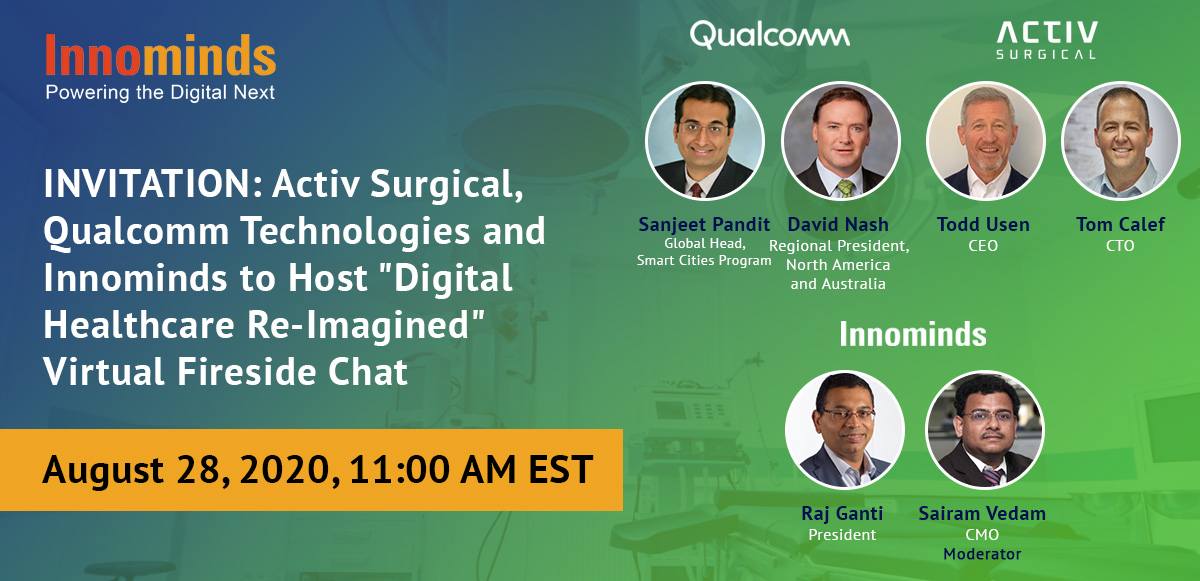Did you know that preventable medical errors are the third-leading cause of death (about 400,000 annually) in the US and have resulted in $36 billion national cost for preventable surgical errors? *Advanced robotics-assisted surgery systems combined with high quality 5G-based end-to-end connectivity could make a dramatic positive difference in those numbers. What’s needed, however, are Big Data, cloud, AI and analytics platforms and Edge processing to make these systems portable, accessible, affordable and safe.

The COVID-19 pandemic is renewing focus on accelerating the development of digital healthcare solutions. Medical technology companies in areas such as telemedicine and robotic surgeries must step up innovation to assist healthcare service providers in speedily dispensing care and treatment and improving patient outcomes at a time when hospitals and clinics are simply overwhelmed.
The evolution of 5G and its steady spread across countries and a renewed focus on AI and ML as the driving technologies for digital transformation initiatives will create the much-needed momentum.
Nearly 20 years after the FDA approved the first robotic-assisted surgical system and kickstarted the trend of robot-assisted minimally invasive surgeries, we have arrived at a new frontier now.
Next-generation robotic surgery: The evolution of AI and ML, visualization and display technologies, computer vision, advanced imaging technologies are powering the next generation robots that are more efficient and more cost optimized. For example, another startup, Activ Surgical, which conducted a fully autonomous suturing of soft tissue in 2016, has developed an AI and machine-learning (ML) hardware-agnostic platform that enables existing surgical systems to see in real-time what humans cannot currently see, including blood flow. Activ Surgical’s product portfolio includes hardware agnostic imaging software and computer- driven guidance systems, both for scopes and robots, to improve situational awareness and real-time imaging during surgical procedures and enable safe tissue access. Its surgical intelligence platform allows minimally invasive surgical systems to autonomously collaborate with surgeons.
These systems armed with real-time intelligence and advanced imaging including the visualization of tissue perfusion during surgery has unveiled immense possibilities. The ability to visualize tissue perfusion and vaculature is considered a game changer. Surgeons can now see more than the human eye (and not have to depend on fluorescent dyes—a 70-year old technique) and get data in real time that can help them make accurate decisions during surgery. In short, surgeons get great visibility (augmented visualization) as well as insights.
Sci-Fi becomes reality: Now throw in a 5G network and imagine the possibilities. Autonomous robotic surgeries conducted remotely could be one such. World-class surgeons could potentially perform surgery from anywhere in the world without having to be physically present in the operating room. Of course, there have been successful trials. But 5G with its extremely low latency and superb end-to-end connectivity is making remote surgical procedures much safer than ever before. The potential for digital healthcare delivery is no longer limited to just a few hospitals but can be expanded at a city, regional and national level. Qualcomm Technologies Smart Cities Accelerator program, for example, has a critical component of enabling intelligent digital healthcare services.
Innominds is organizing a virtual Fireside Chat with Qualcomm and Activ Surgical on ‘Digital Healthcare Re-imagined’ on August 28, 2020.
Enabling portability and intelligence: While innovative robotic hardware and software systems and the momentum created by the COVID-19 pandemic are set to redefine digital healthcare, there are a couple of issues that need to be tackled in the development of autonomous surgical systems.
First, the hardware needs to be portable. A mobile form factor will increase utilization as the equipment can be easily moved from room to room or to new location, reducing the total cost of ownership.
The second aspect is Data. AI and ML-based systems need mountains of trained data. Afterall, autonomous systems are built and perfected over massive amounts of data. Take for example, autonomous cars—these were trained and tested on billions of miles of driving data. Or language translation models trained on trillions of words.
Similarly, robotic systems like that of Activ Surgical’s ActivInsightTM need significantly large trained data sets to generate meaningful insights for the surgeon. ActivInsightTM will transform massive amounts of data gathered intra-operatively to help characterize tissue and critical structures, to provide surgeons with augmented visuals and real-time guidance. This product is expected to be underpinned by the industry’s largest annotated data currently being developed by the company with the help of Innominds over the course of this year.
As at least a thousand surgeries need to be annotated for the video processing an automated annotation tool created by Innominds. We are pre-processing the video inputs from various sources, making the data anonymous (to meet the mandated data privacy compliance), and processing it further for annotation with our proprietary analytics platform, iFusionTM and creating trained data.
Given the large data sets required to create scalable video stores, there are two aspects to consider: One is the acquisition of data and the second, the management of data. After acquiring data from various sources, it needs to be stored and processed for generating insights with AI and analytics. A platform such as iFusionTM and a big data or cloud data management platform are essential for building autonomous surgical systems.
As the end-to-end connectivity of 5G networks and intelligent robotic-assisted surgery systems augment the capabilities of surgeons around the world, we at Innominds are happy to be one of the enablers in this revolutionary change in the healthcare world.
This is the reason we are bringing together Qualcomm Technologies’ Sanjeet Pandit, Global Head, Smart Cities Program, David Nash, Regional President, North America and Australia with Activ Surgical’s CEO, Todd Usen and CTO, Tom Calef to talk about how 5G and intelligent surgery platforms can reduce preventable surgical errors and complications and improve patient outcomes. To register for the webinar on August 28, click here.
*Strengthening the Medical Error “Meme Pool” Benjamin L. Mazer MD, MBA & Chadi Nabhan MD, MBA; Journal of General Internal Medicine volume 34, pages2264–2267(2019)




